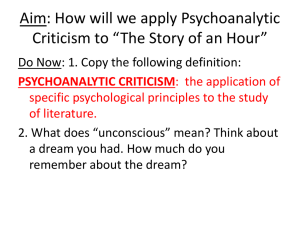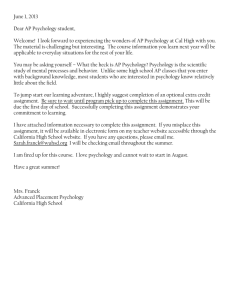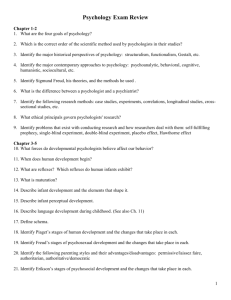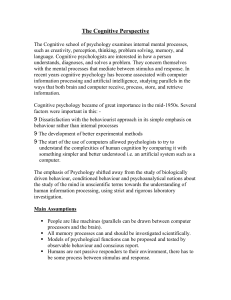The Physiological approach:
advertisement
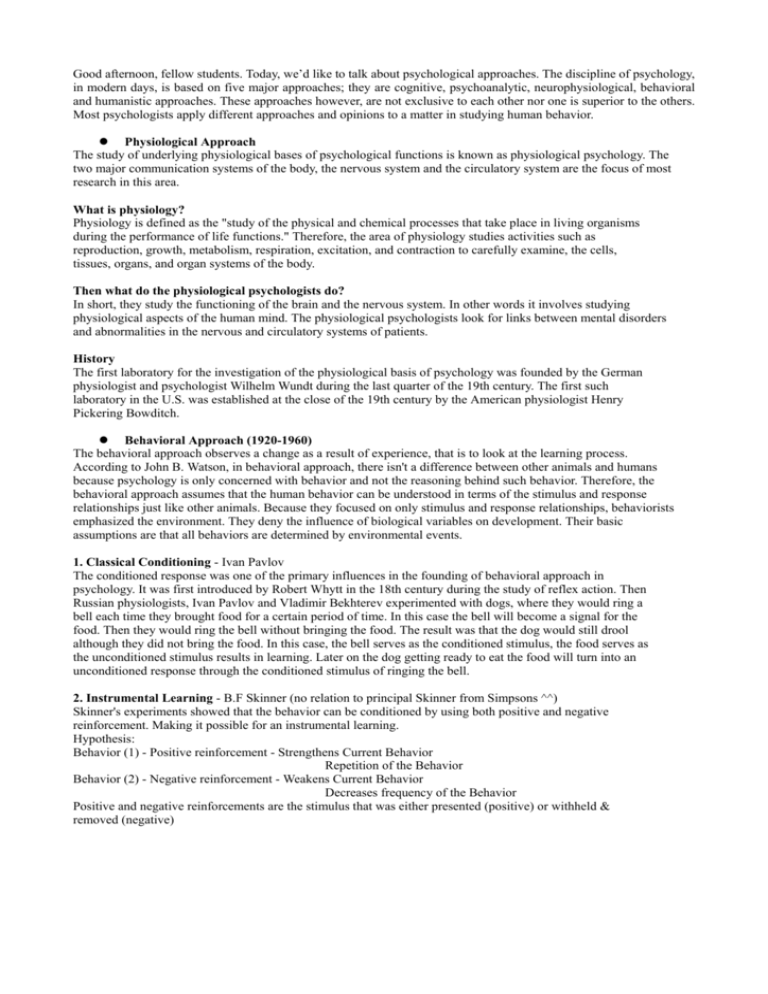
Good afternoon, fellow students. Today, we’d like to talk about psychological approaches. The discipline of psychology, in modern days, is based on five major approaches; they are cognitive, psychoanalytic, neurophysiological, behavioral and humanistic approaches. These approaches however, are not exclusive to each other nor one is superior to the others. Most psychologists apply different approaches and opinions to a matter in studying human behavior. Physiological Approach The study of underlying physiological bases of psychological functions is known as physiological psychology. The two major communication systems of the body, the nervous system and the circulatory system are the focus of most research in this area. What is physiology? Physiology is defined as the "study of the physical and chemical processes that take place in living organisms during the performance of life functions." Therefore, the area of physiology studies activities such as reproduction, growth, metabolism, respiration, excitation, and contraction to carefully examine, the cells, tissues, organs, and organ systems of the body. Then what do the physiological psychologists do? In short, they study the functioning of the brain and the nervous system. In other words it involves studying physiological aspects of the human mind. The physiological psychologists look for links between mental disorders and abnormalities in the nervous and circulatory systems of patients. History The first laboratory for the investigation of the physiological basis of psychology was founded by the German physiologist and psychologist Wilhelm Wundt during the last quarter of the 19th century. The first such laboratory in the U.S. was established at the close of the 19th century by the American physiologist Henry Pickering Bowditch. Behavioral Approach (1920-1960) The behavioral approach observes a change as a result of experience, that is to look at the learning process. According to John B. Watson, in behavioral approach, there isn't a difference between other animals and humans because psychology is only concerned with behavior and not the reasoning behind such behavior. Therefore, the behavioral approach assumes that the human behavior can be understood in terms of the stimulus and response relationships just like other animals. Because they focused on only stimulus and response relationships, behaviorists emphasized the environment. They deny the influence of biological variables on development. Their basic assumptions are that all behaviors are determined by environmental events. 1. Classical Conditioning - Ivan Pavlov The conditioned response was one of the primary influences in the founding of behavioral approach in psychology. It was first introduced by Robert Whytt in the 18th century during the study of reflex action. Then Russian physiologists, Ivan Pavlov and Vladimir Bekhterev experimented with dogs, where they would ring a bell each time they brought food for a certain period of time. In this case the bell will become a signal for the food. Then they would ring the bell without bringing the food. The result was that the dog would still drool although they did not bring the food. In this case, the bell serves as the conditioned stimulus, the food serves as the unconditioned stimulus results in learning. Later on the dog getting ready to eat the food will turn into an unconditioned response through the conditioned stimulus of ringing the bell. 2. Instrumental Learning - B.F Skinner (no relation to principal Skinner from Simpsons ^^) Skinner's experiments showed that the behavior can be conditioned by using both positive and negative reinforcement. Making it possible for an instrumental learning. Hypothesis: Behavior (1) - Positive reinforcement - Strengthens Current Behavior Repetition of the Behavior Behavior (2) - Negative reinforcement - Weakens Current Behavior Decreases frequency of the Behavior Positive and negative reinforcements are the stimulus that was either presented (positive) or withheld & removed (negative) Few experiments with PICTURES. regarding... perceptions. Cognitive Approach Now, I’d like to talk about cognitive approach. Cognitive psychology is concerned with things that we call ‘mind’ or ‘mental processes’. Major topics for cognitive psychology cover areas of perception, language, memory, processing, reasoning, thinking, problem solving, decision-making and so on. Simply, it studies how human brains receive and interpret certain information and how the inputted information results in one’s action or behavior. We can divide cognitive psychology into two studies. One is cognitive developmental theory developed by Jean Piaget and the other is information process theory. Cognitive Developmental Theory Piaget’s cognitive developmental theory greatly influenced developmental and educational psychology. His theory focuses on how people and children come to know. He believed that people and children go through processes of cognitive development as they grow. There are 4 stages of cognitive development identified by Piaget which include Sensorimortor, preoperational, concrete operational and formal operational stages. As we have covered this in the last week’s presentation on moral development, I will just move on to information process theory which is more relevant to the main issue. Information Process Theory Recognition Cognitive psychologists regard human beings as active information processors. From their point of view, men tend to process what has been perceived and change it into another form as well. I will tell you an example to help your understanding. We read newspapers. What’s written there is a combination or arrangements of ink particles. We can call them physical stimulus. What has been inputted to our visual organs is the light projected to eyes from the surface of the paper. This input will cause nueral action and deliver information to our brains. This is how we read, see and remember things. There are many transformations occur between our experience of seeing and reading and stimulus. In more detail, light transforms to some kind of visual form and we compare the received information with the past experience. So cognition is a process that you keep transforming stimuli, input and save them to your memory and you can also recall what you saved whenever you want. As you might have noticed, the whole process of cognition is very much like computer processing. In your mind, information is selected and can be compared, combined or transformed. This process determines one’s action. Hypothetically, it has been asserted that there are stages of cognition which are stages of perception, image, problem solving, memorizing and thinking. They all lie between stimulus and reaction. Perception This theory has contributed significantly toward every study of psychology particularly to learning, memorizing, thinking and communication. So far, I’ve been looking at how you recognize and process things and now, I’d like to look at the perception in more detail. When talking about perception, there is theory called Gestalt principle. It’s a German word for patterns or forms. Max Wertheimer is the founder of Gestalt psychology. He explained that when we perceive a thing, we experience the whole effect or pattern and not through individual characters. Proximity: We tend to group things together that are close together in space. Good Continuation: We tend to perceive things in good form. Similarity: We tend to group things together that are similar. Closure: We tend to make our experience as complete as possible. Pragnanz: We like things that are well-balanced and simple. Figure and Background: We tend to organize our perceptions by distinguishing between a figure and a background. Prejudice In addition to perception, we can now look at prejudice as a saved information or image. Prejudice is an extreme attitude and it is a reaction that is learnt to avoid the possible danger. For example, if you got ill because of a certain food, then you wouldn’t want to try that food or similar one again. This however, can cause irrational and antisocial actions or attitudes such as racism, sexism and age discrimination etc. Prejudice can be formed just by hearing someone’s negative comment on something. Psychoanalytic Approach Cognitive psychology can be contrasted with the psychoanalytic, behavioral and humanistic views. Now, I’d like to move on to psychoanalytic approach. Psychoanalytic approach focuses on the unconscious and emphasizes the role of emotional communications in the analytic situation, especially in the analyst’s interventions. It has influenced the personality study in great deal. Psychoanalytic approach was initiated by Sigmund Freud. Psychoanalytic is not based on experiments like others. When Freud was studying psychology, we conducted clinical interviews with people instead of experiments. Freud’s Theory The theory of Freud is based on the concept that most of our action is controlled by unconscious processes. What we mean by unconscious processes is something that we aren’t aware of but influences our thinking, hidden motivation, desire and fear. In the system of human mind, there is id which ego and superego want to control but they can’t completely control it. This instinct is not showed in everyday life but can be showed in unconscious verbal lapses, dreams, habit or hysteric state. Sometimes, it is expressed in literary works and arts etc. Freud asserted that there is always a motivation for every action and that motivation comes from unconsciousness. Freud also thought of nature of human beings as evil and negative. Freud said that action is determined by instinct like animals and their desire is immoral and irrational. Freud thought human beings are instinctively violent so there is no way that human beings live together in a peaceful state. Other Psychologists’ Point of View There are many psychologist who support this psychoanalytic approach and most of them agree that problem is caused by conflict and unstable childhood experience related to unconscious desire but their views on the characteristics of unconscious impulses differ. Freud asserted that unconscious impulse is caused by sexual desire while others focus on the importance of cultural and social influences, unconscious motivation and childhood experiences. While psychoanalytic psychology focused on the importance of the conflict and motivation from the unconsciousness traditionally, in modern days, psychologists like Erich Fromm and Erik Erikson emphasize more on self-direction instead of sexual and violent impulse. Humanistic Approach The humanistic approach is based on views of human nature that emphasize the human potential for goodness. Carl Rogers, the leading scholar for the humanistic therapies said that "People are driven by an innate tendency to maintain and enhance themselves, which in turn moves them toward growth, maturity, and life enrichment." Humanist psychologists believed that intellectual insight is powerless to change people as argued by the psychoanalytic psychologists. Humanist psychologists believed that in order for a person to be cured, un-met needs must be brought back to awareness. The Comparisons Among the Five Major Approaches in Psychology: Approaches Concepts Views on human nature Neurophysiological Actions are based on biological functions The understanding of the world and thinking processes Observable actions Unconscious factors Cognitive Behavioral Psychoanalytic Neutral A focus on the mental process Middle An emphasis on environment/human Human Neutral Maximum Human and environment Neutral Negative Minimum Maximum Environment Human Humanistic Desires to realize the potentials of people Positive Maximum Human 2003/11/12 Borah Ryu Wooseung Sohn Major Approaches in Psychology: Neurophysiological (Physiological) Approach Behavioral Approach Cognitive Approach Psychoanalytic Approach Humanistic Approach Neurophysiological (Physiological) Approach: The nervous and circulatory systems What is physiology? What do the physiological psychologists do? The history of physiological psychology Behavioral Approach: A focus on observable behavior Classical Conditioning by Pavlov Instrumental Learning by Skinner Cognitive Approach: Cognitive developmental theory by Piaget Information process theory Recognition, Perception, Prejudice Psychoanalytic Approach: A focus on the unconscious Freud’s theory Other psychologists’ point of view Humanistic Approach: A focus on personal growth and interpersonal relationship An emphasis on the human potential for goodness Carl Rogers The Comparisons Among the Five Major Approaches in Psychology: Approaches Concepts Neurophysiological Actions are based on biological functions The understanding of the world and thinking processes Observable actions Unconscious factors Desires to realize the potentials of people Cognitive Behavioral Psychoanalytic Humanistic Views on human nature Neutral Focus on the mental process Middle Emphasis on environment/human Human Neutral Maximum Human and environment Neutral Negative Positive Minimum Maximum Maximum Environment Human Human

